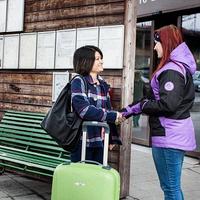2C: Catalina møter Cecilie
||trifft|
C|Catalina meets Cecilie|meets|Cecilie
||spotyka|
2C|Catalina|se encuentra con|Cecilie
2C: Catalina trifft Cecilie
2C: Catalina meets Cecilie
2C : Catalina rencontre Cécilie
2C: Catalina incontra Cecilie
2C: Catalina susitinka su Cecilie
2C: Catalina ontmoet Cecilie
https://www.ntnu.edu/web/nowin/2/catalina
2C: Catalina spotyka Cecilie
2C: Catalina conhece Cecília
2C: Каталина встречает Сесилию
2C: Catalina, Cecilie ile tanışıyor
2C: Каталіна зустрічає Сесілі
2C: Catalina se encuentra con Cecilie
Det er onsdag morgen, og MS Midnattsol kommer til Harstad.
|||||Миднаттсол||||
||mercredi|||||||
It|is|Wednesday|morning||MS stands for "Motor Ship."|Midnight Sun|||Harstad
||Mittwoch||||Mitternachtssonne|||
||mercoledì|||||||
Es|es|miércoles|mañana|y|MS|Midnattsol|llega|a|Harstad
Es ist Mittwochmorgen und MS Midnattsol kommt in Harstad an.
It is Wednesday morning, and MS Midnattsol arrives in Harstad.
C'est mercredi matin, et le MS Midnattsol arrive à Harstad.
Jest środa rano i MS Midnattsol przybywa do Harstad.
Es miércoles por la mañana, y el MS Midnattsol llega a Harstad.
Klokka er åtte.
The clock||eight o'clock
La hora|es|ocho
Es ist acht Uhr.
It is eight o'clock.
Il est huit heures.
Jest ósma.
Son las ocho.
Catalina skal ta bussen til Narvik.
|"will"|take|||Narvik
Catalina|debe|tomar|el autobús|a|Narvik
Catalina will take the bus to Narvik.
Catalina va prendre le bus pour Narvik.
Catalina pojedzie autobusem do Narwiku.
Catalina tomará el autobús a Narvik.
Ved bussen står ei kvinne og venter.
||||женщина||
près de||||||attend
By|the bus|is standing|a|woman||is waiting
||||Frau||wartet
Junto a|el autobús|está|una|mujer|y|espera
|autobusie|||kobieta||czeka
Eine Frau wartet am Bus.
A woman is waiting by the bus.
À l'arrêt de bus, une femme attend.
Przy autobusie czeka kobieta.
En la parada de autobús hay una mujer esperando.
Hun spør hvor Catalina skal.
||где||
|fragt|||gehen wird
She|asks|where||is going
|pyta|gdzie||
Ella|pregunta|dónde|Catalina|va
Sie fragt, wohin Catalina geht.
She asks where Catalina is going.
Elle demande où va Catalina.
Pyta, dokąd idzie Catalina.
Она спрашивает, куда идет Каталина.
Ella pregunta a dónde va Catalina.
**Catalina**: Jeg skal til Narvik.
|я|||
|I|"am going"||
|Yo|iré|a|Narvik
Catalina: Ich fahre nach Narvik.
Catalina: I'm going to Narvik.
Catalina : Je vais à Narvik.
Каталина: Я еду в Нарвик.
Catalina: Voy a Narvik.
**Kvinna**: Jeg skal med samme buss som deg.
женщина|||||||
||||||que|
Woman||"am going"|take|the same||as|you
Frau|||||||
kobieta|||||||
Mujer|Yo|tomaré|en|mismo|autobús|que|tú
Frau: Ich fahre mit dem gleichen Bus wie du.
Woman: I'm going on the same bus as you.
Femme : Je prends le même bus que toi.
Kobieta: Jadę tym samym autobusem co ty.
Женщина: Я еду на том же автобусе, что и ты.
La mujer: Yo voy en el mismo autobús que tú.
**C**: Er det langt?
|||далеко
|||far
|Es|eso|lejos
C: Is it far?
C : Est-ce loin ?
Ch: Czy to daleko?
Каталина: Далеко ли это?
C: ¿Está lejos?
**K**: Det er 12 mil og tar to timer med buss.
|||miles||||heures||
K(1)|||75 miles|and|takes|two|hours|by|
|||120 Kilometer||||||
|Eso|es|millas|y|toma|dos|horas|en|autobús
K: Es sind 12 Meilen und die Fahrt mit dem Bus dauert zwei Stunden.
K: It is 12 miles and takes two hours by bus.
K : C'est 12 miles et ça prend deux heures en bus.
K: To jest 12 mil i zajmuje dwie godziny autobusem.
K: Son 12 millas y toma dos horas en autobús.
**C**: Hvor mye koster billetten?
|||kostet|das Ticket
||"How much"|costs|the ticket
||||le billet
|Cuánto|mucho|cuesta|el billete
C: Wie viel kostet das Ticket?
C: How much is the ticket?
C: Combien coûte le billet ?
K: Ile kosztuje bilet?
C: ¿Cuánto cuesta el billete?
**K**: Den koster 185 kroner.
K|||kroner
|Eso|cuesta|coronas
K: Es kostet 185 NOK.
K: It costs NOK 185.
K: Il coûte 185 couronnes.
K: Cuesta 185 coronas.
**C**: Så mye?
|So much|so much
|Tan|mucho
C: So viel?
C: So much?
C: Autant ?
Cz: Aż tyle?
Ç: Bu kadar mı?
C: ¿Tanto?
**K**: Ja.
K(1)|
|Sí
K: Yes.
K: Oui.
K: Sí.
Det koster mye for en enkeltbillett.
|||||одиночный билет
|||||billet simple
|||||single ticket
|||||Einzelfahrschein
Eso|cuesta|mucho|por|un|billete sencillo
|||||bilet w jedną stronę
Ein Einzelticket kostet viel.
It costs a lot for a single ticket.
Cela coûte cher pour un billet simple.
Koszt jednego biletu jest ogromny.
Cuesta mucho por un billete sencillo.
**C**: Ok.
|Okay (1)
C|
C: Okay.
C: D'accord.
C: Ok.
Catalina tar buss sammen med kvinna.
|||||женщиной
|||||die Frau
|takes||together|with|the woman
Catalina|toma|autobús|junto|con|la mujer
Catalina fährt mit einer Frau in den Bus.
Catalina takes a bus with a woman.
Catalina prend le bus avec la femme.
Catalina jedzie autobusem z kobietą.
Catalina kadınla birlikte otobüse biner.
Catalina toma el autobús junto con la mujer.
Klokka ett kommer bussen til busstasjonen i Narvik.
|une||||||
|one o'clock||||the bus station||
|jedna||||||
La hora|una|llega|el autobús|a|la estación de autobuses|en|Narvik
At one o'clock the bus arrives at the bus station in Narvik.
À une heure, le bus arrive à la gare routière de Narvik.
A la una llega el autobús a la estación de autobuses en Narvik.
Der møter Catalina Cecilie.
There|meets||
|spotyka||
Allí|encuentra|Catalina|Cecilie
There, Catalina meets Cecilie.
Là, Catalina rencontre Cecilie.
Allí Catalina se encuentra con Cecilie.
Cecilie er fadder for nye studenter, og hun ønsker velkommen til Narvik og HiN.
||||||||souhaite|||||
||Pate|||||||||||
||mentor||new|students||she|welcomes|welcomes||||Narvik University College
||||||||życzy|||||
Cecilie|es|madrina|para|nuevos|estudiantes|y|ella|desea|bienvenida|a|Narvik|y|HiN
Cecilie is a sponsor for new students, and she welcomes you to Narvik and HiN.
Cecilie est marraine pour les nouveaux étudiants, et elle souhaite la bienvenue à Narvik et HiN.
Cecilie jest sponsorem nowych studentów i wita cię w Narwiku i HiN.
Сесилия спонсирует новых студентов и приветствует вас в Нарвике и HiN.
Cecilie es madrina de nuevos estudiantes, y da la bienvenida a Narvik y HiN.
SENT_CWT:AFkKFwvL=1.91 PAR_TRANS:gpt-4o-mini=0.98
es:AFkKFwvL
openai.2025-02-07
ai_request(all=25 err=0.00%) translation(all=20 err=0.00%) cwt(all=116 err=6.90%)

